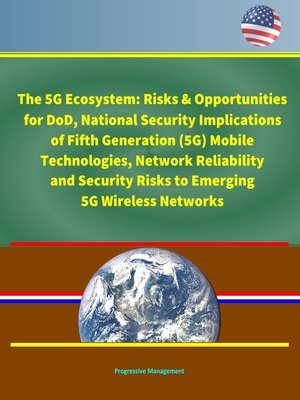The 5G Ecosystem
ebook ∣ Risks & Opportunities for DoD, National Security Implications of Fifth Generation (5G) Mobile Technologies, Network Reliability and Security Risks to Emerging 5G Wireless Networks

Sign up to save your library
With an OverDrive account, you can save your favorite libraries for at-a-glance information about availability. Find out more about OverDrive accounts.
Find this title in Libby, the library reading app by OverDrive.



Search for a digital library with this title
Title found at these libraries:
| Library Name | Distance |
|---|---|
| Loading... |
Three important federal government papers have been professionally converted for accurate flowing-text e-book format reproduction: (a) The 5G Ecosystem: Risks & Opportunities for DoD; (b) National Security Implications of Fifth Generation (5G) Mobile Technologies; (c) Network Reliability and Security Risks to Emerging 5G Wireless Networks.
(a) The term "5G" refers to the oncoming fifth generation of wireless networks and technology that will produce a step-change improvement in data speed, volume, and latency (delay in data transfer) over fourth generation (4G and 4G LTE) networks. 5G will enable a host of new technologies that will change the standard of public and private sector operations, from autonomous vehicles to smart cities, virtual reality, and battle networks. Historical shifts between wireless generations suggest that the first-mover country stands to gain billions in revenue accompanied by substantial job creation and leadership in technology innovation. First movers also set standards and practices that were then adopted by subsequent entrants. Conversely, countries that fell behind in previous wireless generation shifts were obligated to adopt the standards, technologies, and architectures of the leading country and missed out on a generation of wireless capabilities and market potential. The shift from 4G to 5G will drastically impact the future of global communication networks and fundamentally change the environment in which DoD operates. While DoD will feel the impact of 5G, the rollout itself will be driven by the U.S. commercial sector. This study provides insight into the commercial landscape as well as the DoD landscape to give a comprehensive view of the stakeholders and future of 5G.
(b) The fifth generation (5G) of mobile technologies will increase the speed of data transfer and improve bandwidth over existing fourth generation (4G) technologies, in turn enabling new military and commercial applications. 5G technologies are expected to support interconnected or autonomous devices, such as smart homes, self-driving vehicles, precision agriculture systems, industrial machinery, and advanced robotics. According to a Defense Innovation Board (DIB) report, in the military realm, 5G will additionally improve intelligence, surveillance, and reconnaissance systems and processing; enable new methods of command and control; and streamline logistics systems for increased efficiency. As 5G technologies are developed and deployed, Congress may consider policies for spectrum management and national security, as well as implications for U.S. military operations. 5G requires deployment of technologies that work in various segments of the electromagnetic spectrum ("the spectrum"): sub-6, which operates below 6 GHz, and millimeter wave (MMW), which operates between around 24 and 300 GHz.
(c) The telecommunications industry is preparing for the evolution of wireless networks to the next generation of technology, known as 5G. This 5th generation of wireless networks represents perhaps the largest change we have seen in wireless networks since cellular was introduced. The migration away from traditional, engineered systems designed to support specific network functions in a point-to-point network architecture is moving to adopt an IT architecture. As telecom networks are move into the data center, the future architecture uses IT technologies that have supported the Internet for many years.







